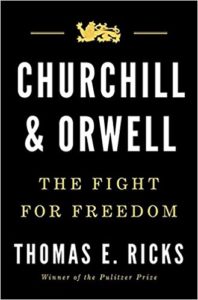Populist parties are on the rise again. Ethnic minorities, migrants, and refugees face discrimination and hatred across much of Europe. Laudable patriotism has slipped into ethno-nationalism in Eastern Europe, a historical canary for increasing repression and fascist sentiments. Last November 11 marked the ninety-ninth anniversary of Polish Independence, but the day also marked one of the largest far-right demonstrations in recent history. According to the Associated Press, 60,000 nationalist protesters marched throughout Warsaw, some bearing slogans like “White Europe.” As we grapple with these trends and try to understand their implications for our time, we would do well to reflect on the threats that fascism and communism have presented in the past and the leaders that combated them.
Churchill and Orwell: The Fight for Freedom by Thomas Ricks is a joint biography of Winston Churchill and George Orwell that focuses on the 1930s and 1940s, pivotal years for both men. The book argues that Churchill and Orwell both realized securing individual freedom against government encroachment from fascism and communism was the vital issue of their time. Ricks’ work draws enlightened comparisons between the imperialist statesman and the socialist writer, and it sews together their political and intellectual development with alternating chapters that focus on Churchill and Orwell.
 Both men were war correspondents whose careers catapulted them forward. For Churchill, this took the form of political success in the wake of his editorialized heroics after covering the Boer Wars in Africa. For Orwell, this meant coming to terms with the dangers of Stalinist communism while in Spain and recognizing that both the left and right have the capacity to distort the truth for their respective causes.
Both men were war correspondents whose careers catapulted them forward. For Churchill, this took the form of political success in the wake of his editorialized heroics after covering the Boer Wars in Africa. For Orwell, this meant coming to terms with the dangers of Stalinist communism while in Spain and recognizing that both the left and right have the capacity to distort the truth for their respective causes.
Additionally, both men experienced rejection from their intellectual and political parties as a consequence of holding to their principles.
For Churchill, his rejection came most intensely during the 1930s. (The second volume of William Manchester’s Churchill biography is titled Alone, 1932–1940). Churchill’s party pushed him aside as one of the few opponents of appeasement. Weary and disheartened in the wake the Great War’s destruction, most of the political and social elite in Britain sought appeasement during the 1930s. So, the political climate valued peace highest, accepting the costs of rising fascism. Churchill remained set in his opposition, but he writes in his memoirs that “it was almost the universal view that my political life was at last ended.”
Orwell experienced a similar break from his intellectual party when he realized the threat of Stalinist communism. In the late 1930s, Orwell traveled to Spain as a correspondent to aid the leftists in the Spanish Civil War, but he became disillusioned with the socialists who employed the same tactics and propagandizing as the fascist right. Soviet spies also hunted him after the Soviets decided anti-communist socialists posed a greater threat to their ideology than the Spanish nationalists. Orwell turned into an outcast socialist, shunned by pro-Stalinists who were loyal to a fault. He recognized that supporters of any political ideology, left or right, had the capacity to lie and manipulate, cutting corners on the truth for their own political ends. This was one of the defining experiences for Orwell’s life and writing.
He left Spain committed to truth irrespective of ideological slant and, like Churchill, did not waver in the face of opposition from his own party. Ricks writes, “By splitting with the conventional, pro-Stalinist left, Orwell made a move that paralleled Churchill’s earlier distancing of himself from the pro-fascist elements of the British aristocracy.”
To be sure, Churchill and Orwell were very different characters. Churchill’s personality was giant and demanded to be heard. Orwell was an introvert and spent much of his professional life writing in solitude. Churchill was an imperialist. Orwell was largely an anti-colonialist as evidenced by his works like Burmese Days, a novel inspired by Orwell’s experiences as a British Imperial police officer in Burma. However, Orwell and Churchill were both committed to preserving the liberty of the individual against all threats—be they from communists, fascists, or their own parties. As Ricks explains, “Despite all their differences, their dominant priority, a commitment to human freedom, gave them common cause.”
This passage from the book perhaps best summarizes the similarities between the two:
In crucial respects they were kindred spirits. In their key overlapping years in the middle of the century, the two men grappled with the same great questions—Hitler and fascism, Stalin and communism… They responded with the same qualities and tools—their intellects, their confidence in their own judgments even when those judgments were rebuked by most of their contemporaries, and their extraordinary skill with words. And both steered by the core principles of liberal democracy: freedom of thought, speech, and association.
One of the strengths of Ricks’ writing is his eye towards the modern day and what role Churchill and Orwell play in contemporary politics. Assessing their contributions, Ricks writes, “Churchill helped give us the liberty we enjoy now. Orwell’s writing about liberty affects how we think about it now.”
In the half century since Orwell’s death, his books’ popularity has exploded. Millions of copies have sold, and his thinly veiled critique of Stalinist Russia, 1984, has come to represent the preeminent reference for the dangers of government encroachment on individual rights.
Ricks quotes a Chinese translator of Orwell who says, “The twentieth century will soon be over, but political terror still survives and this is why Nineteen Eighty-four remains valid today.” The totalitarian dangers of fascism are not unique to right wing ideologies. Just as much danger can come from leftist ideologies that empower the state at the expense of individual liberty. Orwell’s writings remain relevant not because they can support politically motivated warnings against right or left wing parties. They remain important because Orwell opposed the erosion of individual liberty regardless of political ideology or allegiance.
Given the threats to individual liberty that we face today—whether from rising ethno-nationalist parties, state expansion further into the individual’s life and thought, or passive silence in the face of such threats—we would do well to learn from Churchill’s and Orwell’s examples.
With the clarity of a seasoned journalist, Ricks cuts through laudatory or nostalgic depictions of both men, synthesizing the lives of arguably the two most important figures of the twentieth century. Churchill and Orwell excels among individual biographies of both.
—
Grayson Logue is a senior at the King’s College in New York City, pursuing a degree in Politics, Philosophy, and Economics.
Photo Credit: Winston Churchill during the General Election Campaign in 1945. Imperial War Museum, via Wikimedia Commons.







 Sponsor a student for Christianity & National Security 2024
Sponsor a student for Christianity & National Security 2024